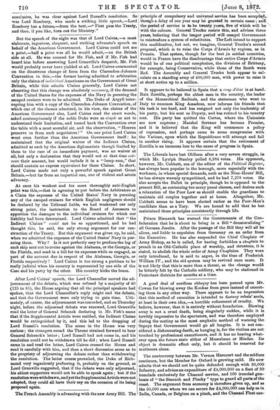But the speech of the night was that of Lord
Cairns,—a most elaborate, ingenious, eloquent, and striking advocate's speech on behalf of the American Government. Lord Cairns could not see a point,—half a point was all he would admit,—on the British side at all. He was counsel for Mr. Fish, and if Mr. Fish had heard him before answering Lord Granville's despatch, Mr. Fish would probably never have yielded at all. Lord Cairns commented on the disastrous change of form from the Clarendon-Johnson Convention to this,—the former having admitted to arbitration only the claims of individual Americans on the Government of Great Britain, while this admits Claims generally, Lord Cairns not observing that this change was absolutely necessary, if the demand of the United States for the expenses of the Navy in pursuing the escaped cruisers were to be admitted. The Duke of Argyll inter- rupting him with a copy of the Clarendon-Johnson Convention, of which one of the clauses admitted, in his view, the claims of the American Government also, Lord Cairns read the exact words, asked contemptuously if the noble Duke were so simple as not to understand their limitation, and tossed back the Convention over the table with a most scornful air, and the observation, "Heaven preserve us from such negotiators !" On one point Lord Cairns went even further than the American Government itself : he maintained that the original waiver of the Indirect Claims, admitted as such by the American diplomatists though limited by them to the case of an immediate payment, was no waiver at
all, but only a declaration that they would not at that time esti- mate their amount, but would include it in a "lump-sum," that
should contain no express equivalent for these Claims. In short, Lord Cairns made not only a powerful speech against Great Britain,—but far from an impartial one, one of violent and astute advocacy.


































 Previous page
Previous page